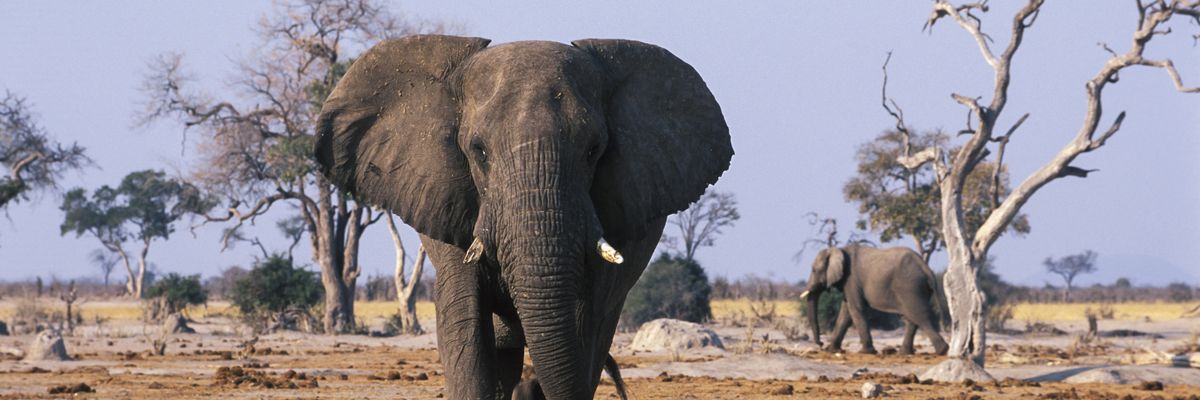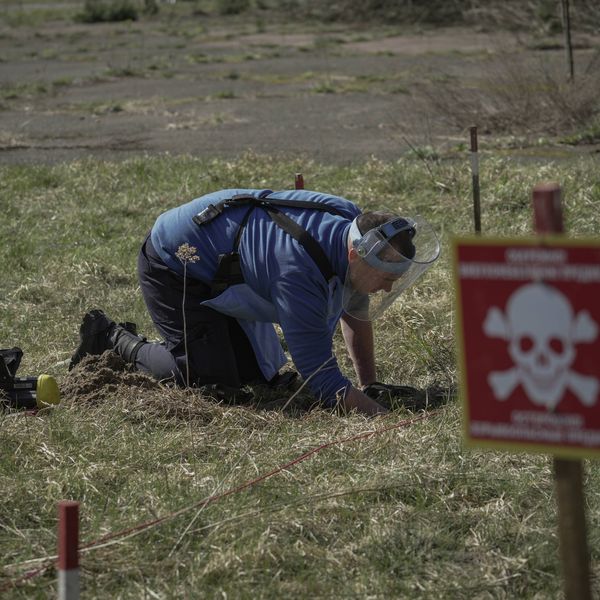
An elephant is seen in the wild.
Advocates 'Crushed' That Biden Import Rules Don't Ban Elephant Trophies
The new restrictions will do nothing to solve "a devastating biodiversity crisis that requires an elephant-sized response," said one campaigner.
Biodiversity advocates said Friday that the Biden administration had taken "a major step back from true conservation accountability" as it announced new restrictions on imports of elephant hunting trophies—restrictions that did not go as far as banning them outright.
The U.S. Fish and Wildlife Service (FWS) said it was strengthening the African elephant rule under Section 4(d) of the Endangered Species Act, requiring countries to annually certify that their elephant populations are "biologically sustainable" and that habitats for the animals are stable. The U.S. will continue importing trophies and live elephants from countries that prove sustainability.
The restrictions also require countries to have domestic wildlife laws that meet the requirements of the Convention on International Trade in Endangered Species (CITES), but that provision doesn't go into effect until 2026.
The restrictions could eliminate trophy imports from Botswana, Mozambique, and Zambia, which currently have national legislation that may not meet CITES requirements.
A previous proposal from the administration in 2022 required that elephant populations were "stable or increasing" in countries in order for imports to continue.
Tanya Sanerib, international legal director for the Center for Biological Diversity (CBD), said the new rules will do nothing to solve "a devastating biodiversity crisis that requires an elephant-sized response."
"These are mouse-sized rule changes that continue to treat elephants like commodities," said Sanerib. "We need global change that prioritizes biodiversity over profits."
CBD pledged to "do everything we can to fight threats to imperiled elephants from trophy hunting."
The new restrictions were announced almost exactly three years after the International Union for Conservation of Nature (IUCN) reassessed protections for elephants, and found that poaching for ivory and habitat loss over several decades had pushed two elephant species closer to extinction.
The African forest elephant is now "critically endangered" and the African savanna elephant is now listed as "endangered." Before 2021, the two kinds of African elephants were treated as a single species and were listed only as "vulnerable."
The Obama administration in 2016 imposed a near-ban on the elephant ivory trade.
The following year, then-President Donald Trump infuriated conservation groups by reversing the ban on imported elephant trophies from Zimbabwe and Zambia, a decision he quickly reverse due to the uproar it caused. In 2018, the Republican president said the FWS would begin issuing permits "to import a sport-hunted trophy on a case-by-case basis."
Sanerib on Friday said she and her organization were "crushed this rule doesn't ban trade in elephant hunting trophies to the United States, and it doesn't even require stable elephant populations to allow trophy imports."
"These magnificent animals are globally cherished but under threat," said Sanerib, "and it's high time we stop letting wealthy trophy hunters turn them into décor."
An Urgent Message From Our Co-Founder
Dear Common Dreams reader, The U.S. is on a fast track to authoritarianism like nothing I've ever seen. Meanwhile, corporate news outlets are utterly capitulating to Trump, twisting their coverage to avoid drawing his ire while lining up to stuff cash in his pockets. That's why I believe that Common Dreams is doing the best and most consequential reporting that we've ever done. Our small but mighty team is a progressive reporting powerhouse, covering the news every day that the corporate media never will. Our mission has always been simple: To inform. To inspire. And to ignite change for the common good. Now here's the key piece that I want all our readers to understand: None of this would be possible without your financial support. That's not just some fundraising cliche. It's the absolute and literal truth. We don't accept corporate advertising and never will. We don't have a paywall because we don't think people should be blocked from critical news based on their ability to pay. Everything we do is funded by the donations of readers like you. Will you donate now to help power the nonprofit, independent reporting of Common Dreams? Thank you for being a vital member of our community. Together, we can keep independent journalism alive when it’s needed most. - Craig Brown, Co-founder |
Biodiversity advocates said Friday that the Biden administration had taken "a major step back from true conservation accountability" as it announced new restrictions on imports of elephant hunting trophies—restrictions that did not go as far as banning them outright.
The U.S. Fish and Wildlife Service (FWS) said it was strengthening the African elephant rule under Section 4(d) of the Endangered Species Act, requiring countries to annually certify that their elephant populations are "biologically sustainable" and that habitats for the animals are stable. The U.S. will continue importing trophies and live elephants from countries that prove sustainability.
The restrictions also require countries to have domestic wildlife laws that meet the requirements of the Convention on International Trade in Endangered Species (CITES), but that provision doesn't go into effect until 2026.
The restrictions could eliminate trophy imports from Botswana, Mozambique, and Zambia, which currently have national legislation that may not meet CITES requirements.
A previous proposal from the administration in 2022 required that elephant populations were "stable or increasing" in countries in order for imports to continue.
Tanya Sanerib, international legal director for the Center for Biological Diversity (CBD), said the new rules will do nothing to solve "a devastating biodiversity crisis that requires an elephant-sized response."
"These are mouse-sized rule changes that continue to treat elephants like commodities," said Sanerib. "We need global change that prioritizes biodiversity over profits."
CBD pledged to "do everything we can to fight threats to imperiled elephants from trophy hunting."
The new restrictions were announced almost exactly three years after the International Union for Conservation of Nature (IUCN) reassessed protections for elephants, and found that poaching for ivory and habitat loss over several decades had pushed two elephant species closer to extinction.
The African forest elephant is now "critically endangered" and the African savanna elephant is now listed as "endangered." Before 2021, the two kinds of African elephants were treated as a single species and were listed only as "vulnerable."
The Obama administration in 2016 imposed a near-ban on the elephant ivory trade.
The following year, then-President Donald Trump infuriated conservation groups by reversing the ban on imported elephant trophies from Zimbabwe and Zambia, a decision he quickly reverse due to the uproar it caused. In 2018, the Republican president said the FWS would begin issuing permits "to import a sport-hunted trophy on a case-by-case basis."
Sanerib on Friday said she and her organization were "crushed this rule doesn't ban trade in elephant hunting trophies to the United States, and it doesn't even require stable elephant populations to allow trophy imports."
"These magnificent animals are globally cherished but under threat," said Sanerib, "and it's high time we stop letting wealthy trophy hunters turn them into décor."
- Amid Global 'Extinction Crisis,' Donald Trump Jr. Auctions Himself Off for Luxurious Wildlife Slaughter Vacation ›
- As Trump Rolls Back Barriers, Big-Game Hunters--Including Rich GOP Donors--Granted Dozens of Permits for Lion "Trophies" ›
- After Calling Practice 'A Horror Show,' Trump Reverses Ban on Animal Trophy Imports ›
Biodiversity advocates said Friday that the Biden administration had taken "a major step back from true conservation accountability" as it announced new restrictions on imports of elephant hunting trophies—restrictions that did not go as far as banning them outright.
The U.S. Fish and Wildlife Service (FWS) said it was strengthening the African elephant rule under Section 4(d) of the Endangered Species Act, requiring countries to annually certify that their elephant populations are "biologically sustainable" and that habitats for the animals are stable. The U.S. will continue importing trophies and live elephants from countries that prove sustainability.
The restrictions also require countries to have domestic wildlife laws that meet the requirements of the Convention on International Trade in Endangered Species (CITES), but that provision doesn't go into effect until 2026.
The restrictions could eliminate trophy imports from Botswana, Mozambique, and Zambia, which currently have national legislation that may not meet CITES requirements.
A previous proposal from the administration in 2022 required that elephant populations were "stable or increasing" in countries in order for imports to continue.
Tanya Sanerib, international legal director for the Center for Biological Diversity (CBD), said the new rules will do nothing to solve "a devastating biodiversity crisis that requires an elephant-sized response."
"These are mouse-sized rule changes that continue to treat elephants like commodities," said Sanerib. "We need global change that prioritizes biodiversity over profits."
CBD pledged to "do everything we can to fight threats to imperiled elephants from trophy hunting."
The new restrictions were announced almost exactly three years after the International Union for Conservation of Nature (IUCN) reassessed protections for elephants, and found that poaching for ivory and habitat loss over several decades had pushed two elephant species closer to extinction.
The African forest elephant is now "critically endangered" and the African savanna elephant is now listed as "endangered." Before 2021, the two kinds of African elephants were treated as a single species and were listed only as "vulnerable."
The Obama administration in 2016 imposed a near-ban on the elephant ivory trade.
The following year, then-President Donald Trump infuriated conservation groups by reversing the ban on imported elephant trophies from Zimbabwe and Zambia, a decision he quickly reverse due to the uproar it caused. In 2018, the Republican president said the FWS would begin issuing permits "to import a sport-hunted trophy on a case-by-case basis."
Sanerib on Friday said she and her organization were "crushed this rule doesn't ban trade in elephant hunting trophies to the United States, and it doesn't even require stable elephant populations to allow trophy imports."
"These magnificent animals are globally cherished but under threat," said Sanerib, "and it's high time we stop letting wealthy trophy hunters turn them into décor."
- Amid Global 'Extinction Crisis,' Donald Trump Jr. Auctions Himself Off for Luxurious Wildlife Slaughter Vacation ›
- As Trump Rolls Back Barriers, Big-Game Hunters--Including Rich GOP Donors--Granted Dozens of Permits for Lion "Trophies" ›
- After Calling Practice 'A Horror Show,' Trump Reverses Ban on Animal Trophy Imports ›

